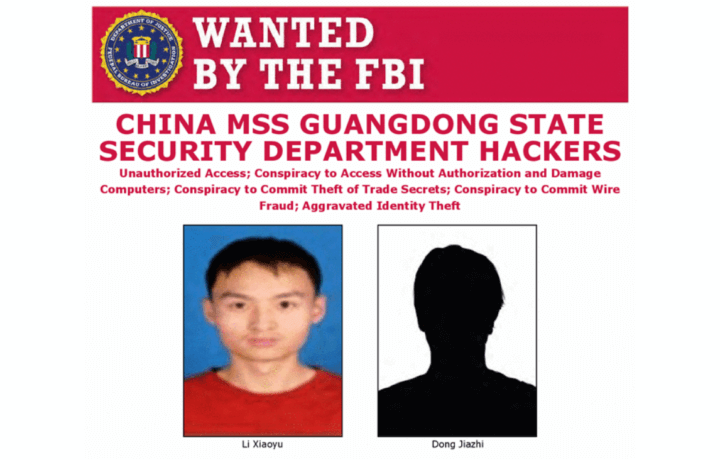Two Chinese nationals have made their way onto the “Wanted by the FBI” list for conducting 11 years of economic espionage, intellectual property theft, extortion, and computer fraud on behalf of China. Li Xiaoyu and Dong Jiazhi were indicted by a grand jury for their efforts in support of China’s Ministry of State Security (MSS), the intelligence arm of the Chinese government. It is clear that the 27-page indictment is just the tip of the iceberg, designed to make the case, but not to demonstrate to China the depth of knowledge garnered by the counterintelligence team as they unraveled and rolled back the 11 years of activity by Li and Dong.
Uncovering the Chinese espionage caper
According to the Department of Justice’s press conference on July 21, the duo’s activities were discovered when they successfully penetrated the Department of Energy’s (DOE) Hanford Site located in Washington state in 2015 and 2018. The site, which once produced nuclear weapons for the U.S., discovered the activities as the duo conducted reconnaissance collecting information on the network, personnel, and acquired lists of users and administrator accounts. The genesis of the investigation which followed showed their nefarious activities went as far back as 2009 and were active up until July 7.
The perfect economic espionage storm
In 2008, I had the pleasure of co-authoring Secrets Stolen, Fortunes Lost, Preventing Intellectual Property Theft and Economic Espionage in the 21st Century with the distinguished Richard Power. The book shared how the four vectors target an entity’s intellectual property for theft: the insider, the competitor, the organized criminal entity, and the nation state – all working as one to create a perfect economic espionage storm.
The nation state, China, issued an edict called “China 2025” where key industrial sectors were identified for advancement. Assistant Attorney General John C. Demers in his remarks concerning this indictment, noted:
Unsurprisingly, the intrusions targeted industries outlined in “Made in China 2025” – China’s ten-year plan for targeting strategic advanced technology manufacturing industries for development. While the plan calls for an innovation-driven approach, cases like this one show it is as much a roadmap to theft as it is guidance to innovate. The intrusions in this case targeted 8 of the 10 technology sectors identified in the plan: next generation information technology, robotics and automated machine tools, aircraft and aircraft components, maritime vessels and marine engineering equipment, clean energy vehicles, new materials, biotechnology, and advanced rail.
China’s Industries Stand to Benefit from Economic Espionage
The use of Li and Dong by the MSS provided the hostile intelligence service with plausible deniability, as China devised a plan to supplant western technology companies and innovation centers with their Chinese competitors. The organized criminal element had the backing and full support of the MSS, as they targeted both networks and insiders within those networks for exploitation. China’s industries and the nation as a whole benefited from this four-vectored approach to intellectual property theft.
Millions Stolen Around the World
The indictment identifies the efforts of Li and Dong were not focused only on the United States, but also 10 other countries (UK, Australia, Belgium, Germany, Japan, Lithuania, the Netherlands, Spain, Sweden, and South Korea). The DOJ tells us that millions of dollars of intellectual property and terabytes of data were stolen over the course of the 11 years. Most recently, they focused their efforts on the COVID-19 research, as evidenced by the indictment’s detailed narrative about the targeted attacks on pharmaceutical and biotech companies. The FBI warned of possible attacks to COVID-19 research back in the spring, and it seems as if they had Li and Dong in mind.
China’s Hunger for Intellectual Property Drives Espionage
Deemer explained that the “Chinese Communist Party’s insatiable hunger for American and other non-Chinese companies’ hard-earned intellectual property, including COVID-19 research” was the impetus behind the MSS backing of these two individual’s endeavors.
In a country of over 1.3 billion, could these be the only two criminals actively working against the West on behalf of the MSS? China’s economic espionage actions targeting western technologies have been active for more than 40 years, with many of these activities occurring within the area of responsibility for their consulate in Houston. On July 21, the U.S. State Department advised the Chinese government that they had 72 hours to vacate, tying the order directly to the economic espionage activities of China.



